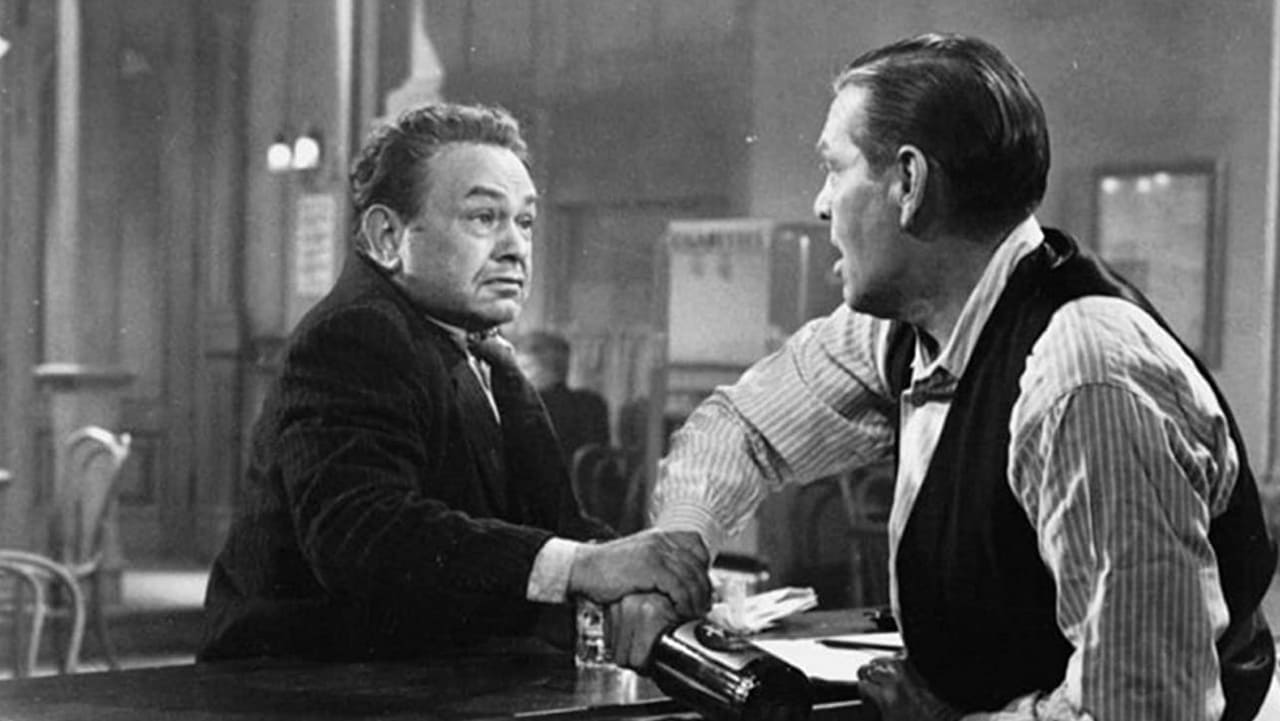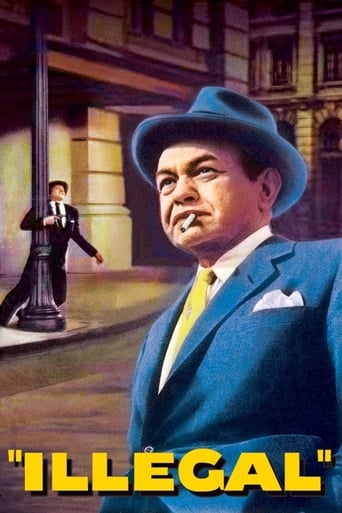Curapedi
I cannot think of one single thing that I would change about this film. The acting is incomparable, the directing deft, and the writing poignantly brilliant.
Jenna Walter
The film may be flawed, but its message is not.
Calum Hutton
It's a good bad... and worth a popcorn matinée. While it's easy to lament what could have been...
Zlatica
One of the worst ways to make a cult movie is to set out to make a cult movie.
blanche-2
Edward G. Robinson plays a disgraced D.A. who starts working for the very people he tried to put away in "Illegal," a 1955 film also starring Nina Foch, Hugh Marlowe, Albert Dekker, Jayne Mansfield, and Ellen Corby.When he is unable to stop the death row execution of an innocent man in time, Victor Scott (Robinson) sinks to the depths, turning to alcohol, until he realizes that he can have a lucrative career as a defense attorney for the mob. This is a disappointment to his protégé Ellen (Foch), who worked as his legal assistant and is still in the D.A.'s office along with her new husband (Marlowe). When someone from that office is suspected of leaking information to Scott, Ellen becomes a suspect.This was not a huge budget film. Instead, director Lewis Allen uses a real building interior and the streets of LA for some scenes, which really adds to the atmosphere.Robinson really dominates this film -- for a short man, he was a towering presence. I loved the scene where he admires the mobster's art collection -- it was actually loaned to the studio by Robinson. Besides Corby, future TV series stars DeForest Kelly and Edward Platt appear in smaller roles. Jayne Mansfield has a good part in her film debut, that of a singer/girlfriend of a mob boss. Nina Foch hands in a strong performance as the disillusioned Ellen.I had one small problem with the denouement of this film. Everything hinged on a phone call, but couldn't one access phone records in 1955? There is no mention of this; instead, there is a scramble for a witness. Odd, but a good film nonetheless.
funkyfry
This is as good an example of what you might call "character suspense" of any film I can think of from the 50s. Edward G. Robinson keeps the audience wondering about his motives and ethics right down to the end; any time the scenario threatens to get stale, he throws a curve at us just like his character, district attorney turned legal gun-for-hire Victor Scott. Compelled by his obsession with the woman who he helped to raise, Ellen Miles (Nina Foch) and an ego that will not allow him to lose a single case, he seems to careen into one situation after another out of his control only to somehow emerge victorious and heroic.The story is kicked off by a series of events surrounding an innocent man accused of a murder, played by DeForest Kelly. After having convicted and executed an innocent man, Scott loses faith in his ability to prosecute and hits the bottle hard. He finds his edge again in criminal defense after spending a few nights in the tank himself. Some aspects of the story at this point are just a fairly obvious progression towards a redemption moment, but Robinson keeps everything moving forward by inserting his own brand of ambiguity into the character, made up of the small but obvious moments that lend charm to so many of his performances.The film is not really notable in terms of direction. In fact if anything it's notable as an example of good acting triumphing over mediocre direction; there are a lot of scenes like the one when Robinson comes out of the courtroom after drinking the poison and stops to drink at a fountain, that seem to me poorly staged compared to the effect he could have achieved.A movie made very classy by two memorable stars, Robinson as well as Foch. Foch seems unsure of her character at some points, perhaps due to the direction or the often strange script, but she makes something out of her scenes with Robinson and Hugh Marlowe (playing her devious husband). Marlowe seems uncomfortable in the role, if an actor as stiff as Marlowe can ever be said to be un-nerved then he was in some scenes in this film.
Terrell-4
This movie starring Edward G. Robinson brings mixed feelings: Admiration for Robinson's skill and stature as an actor; affection for the man, who was a decent and admirable human being; and sadness bordering on disgust for the kind of movies, such as this one, Robinson made beginning in the early Fifties. He'd been unofficially blacklisted during the Commie witch-hunts of the late Forties and Fifties. The studio heads wanted no trouble from Congressional investigations or write-ups in such virulent rags as Red Channels. Robinson's crime: It was whispered that he was too liberal. To make a living and to continue acting, Robinson had to take on such things as Vice Squad (1953), Black Tuesday (1954), Tight Spot, A Bullet for Joey and Illegal (all 1955). It wasn't until Frank Sinatra insisted Robinson be cast in A Hole in the Head in 1959, when Robinson was 66, that studio heads decided that he was safe enough to be used in A-level movies. Ambitious, competitive D.A. Victor Scott (Robinson) sends an innocent man to the chair. It was a mistake, but that doesn't help the man who was executed. Now the man the newspapers called the Napoleon of the Courtroom not only has his career destroyed, but his belief in himself as a prosecutor. He quits as D.A. From now on Scott will fight for the defense. Well, you know how it goes. Before long Scott is defending crooks and killers. He's aggressive in the court, using every trick, emotion and manipulation to win. It's not long before he finds himself ensnarled in the affairs of the powerful Frank Garland, a kingpin of oil wells, breweries, trucking, hotels, investment companies and vice. Garland is a man who buries his mistakes. Sooner or later Victor Scott, manipulator extraordinaire of juries, is going to come face to face with his conscience, especially when Ellen Miles (Nina Foch), a woman he realizes he may love, is charged with murder and Garland is involved. He'll have some decisions to make. Illegal isn't an A-movie. It's a melodramatic not quite B-movie. The difference, or course, is Edward G. Robinson. While the melodrama piles up, Victor Scott stays tough and smart. Robinson makes him effortlessly believable. Robinson, a noted art collector, loaned two paintings from his collection for a scene in the movie he shares with Albert Dekker as Garland. It's an amusing moment watching Robinson as Scott comment on Garland's collection of Impressionist masterpieces that were owned by Robinson. "Degas!...and isn't that a Gauguin?...I've always had to content myself with reproductions." Robinson plays it absolutely straight. It's always a pleasure to watch Nina Foch at work. Jayne Mansfield shows up in her first movie as a singer in a nightclub who earns Garland's pay in more ways than one. What she does to "To Marvelous for Words" should have stopped her career in its tracks.
ZenVortex
This movie reminded me of how great an actor Edward G. Robinson was. His performance is absolutely brilliant as the tough crime-fighting D.A. who sends an innocent man to the electric chair, then drowns his sorrows in the bottle and morphs into an unscrupulous attorney for the Mob.There is some terrific dialog, like when he admonishes the new D.A. with: "When you sit in that chair and have a thought, just remember, I sat there too and had it before you." Although the remainder of the cast deliver good performances, the movie is basically a showcase of Robinson's incredible acting talent. He dominates every scene he is in -- except where the gorgeous Jayne Mansfield is present, who plays the crime boss's classy mistress.Mansfield is poetry-in-motion, a screen goddess, and much better than Marilyn Monroe ever was. This is her film debut and she only appears in a few short scenes - which she totally steals - but is absolutely stunning eye candy. It's worth noting that although Mansfield is portrayed as a dumb blonde, in real life she had an IQ of 163, spoke 5 languages, and was an accomplished pianist - a talent she splendidly shows off in the movie by playing and singing for the crime boss. The direction and cinematography are good. There are some nice plot twists and Robinson finally redeems his character in an unexpected ending. This movie is classic noir and not to be missed.

